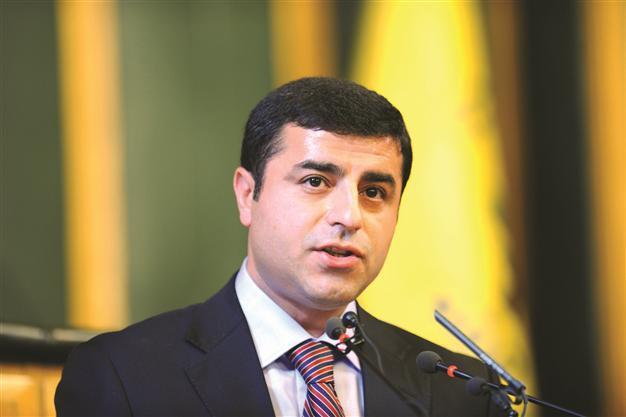BDP boycotts panels in Parliament
ANKARA

BDP co-chair Selahattin Demirtaş
slams the gov’t over hunger strikes. Daily News Photo
Peace and Democracy Party (BDP) executives announced they would suspend work at parliamentary committees as long as hunger strikes by around 700 prisoners – which entered their 61st day Nov. 11 – continue. Prime Minister Recep Tayyip Erdoğan defined both the hunger strikes and the deputies’ participation as “blackmail” and vowed that the government would not bow to it.
BDP co-leader Selahattin Demirtaş said yesterday the government has been trying to get results with a “security concept,” and the hunger strikes “knocked it down.”
He added that the BDP will not be silent in case of deaths, recalling that seven BDP deputies are also on hunger strike in the southeastern province of Diyarbakır.
“If someone will die, it will be us, whom you gave authority [by voting for us]. If you are resisting to death, we will resist to death,” Demirtaş said in Ankara.
Deputies on strike“Every minute and second that passes without resolution spells danger for the lives of the people in the prisons. We are concerned and we are reacting to the absence of a resolution,” BDP co-chair Gülten Kışanak said on Nov. 10 at a press conference in Diyarbakır as she announced that she and four more BDP deputies – Aysel Tuğluk, Adil Kurt, Sırrı Süreyya Önder and Sabahat Tuncel – and Diyarbakır Mayor Osman Baydemir were going on an indefinite hunger strike in a bid to share the burden with the prisoners.
BDP Van deputy Özdal Üçer and Diyarbakır deputy Emine Ayna already began a hunger strike on Nov. 8.
In a speech delivered in Trabzon on Nov. 11, Erdoğan slammed both hunger strikers and the BDP deputies.
“Let it be hunger strikes or a death fast, they are blackmail, a bluff and showing off. Now deputies are on a hunger strike. Let them do whatever they want. Our duty is obvious. We will take the necessary interventions for health. We don’t bow to such blackmail,” Erdoğan said.
Today, all eyes will be on government officials as Justice Minister Sadullah Ergin said on Nov. 8 that a legal arrangement paving the way for the use of mother tongue in courts – one of the three key demands of the hunger strikers – will be sent to Parliament as soon as Erdoğan returns home from abroad, which he did late Nov. 10.
In Ankara Deputy Prime Minister Bülent Arınç held a meeting Nov. 10 with BDP co-chair Selahattin Demirtaş and Mardin independent deputy Ahmet Türk.
Following a Cabinet meeting on Nov. 5, Arınç said legal defense in Kurdish would soon be possible with an amendment to Article 202 of the Criminal Procedure Code (CMK). Individuals will be able to defend themselves in the language they think they can best express themselves in, Arınç said, adding that convicted Kurdistan Workers’ Party (PKK) leader Abdullah Öcalan could meet with his lawyers if he wishes to on the condition that the related procedure is properly followed. Arınç nimplied the government’s readiness to heed strikers’ demands, defining the BDP’s decision to suspend parliamentary activity, as “self-denial.”
